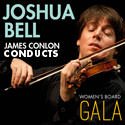Gala Benefit Evening at the Ravinia Festival
Gala Benefit Evening at the Ravinia Festival
Smith: “The Star-Spangled Banner”
(celebrating the 200th anniversary of our national anthem)
Mozart: Overture to Der Schauspieldirektor (The Impresario), K. 486
Bruch: Violin Concerto No. 1 in G Minor, Op. 26
Dvořák: Symphony No. 8 in G Major, Op. 88
Chicago Symphony Orchestra
James Conlon, Conductor
Joshua Bell, Violin
This past Saturday’s CSO concert at Ravinia (featuring superstar violinist Joshua Bell) must be counted a success on the whole, notwithstanding the occasional executional or interpretative shortcoming. The overture to Mozart’s Impresario that followed the National Anthem took perhaps a minute to settle down, the fast string runs of the opening measures marked by excrutiangly sloppy execution by any standard, let alone that of the Chicago Symphony. Fortunately, matters improved soon enough that I was able to enjoy the vigorous yet elegant dash led by Ravinia Festival director James Conlon through this sparkling piece.
Max Bruch’s First Violin Concerto is not the most inspired work of its kind, although it has many lovely moments, and I am not sure that the wildly popular (by violinists’ standards) Joshua Bell is the ideal exponent of its merits. Bell plays with an exceptionally lovely tone, although not the most powerful one, and tremendous personality, although the latter is more often than not an overwrought one; at its worst, this both has a cloying effect and entails a lack of rhythmic control. Readers know of my enthusiasm for strong personality in a performer, but the finest extreme musical personalities, the tendency toward hysteria is tempered by a touch of poise and dignity.
Bell’s relative lack of these traits did little service to the rather glum and spineless first movement of the Bruch concerto, although I must confess that I was not bored for a moment. (This movement is mainly a showpiece for the first violin, yet the few orchestral interludes were engaging and rather more balanced under Conlon’s baton.) The lovely slow movement provided Bell with less opportunity for melodrama, although again I wished for just a little more poise to temper his otherwise wonderfully pliant sense of phrase. His playing in the boisterous “Hungarian” finale could have been a touch more robust, but on the whole this movement saw Bell, Conlon, and the orchestra bring the performance to a satisfying close. With regard to the piece as a whole, just an extra touch of restraint on Bell’s part would have made for a fine interpretation indeed. As an encore, Bell and the orchestra offered the theme from the film Ladies in Lavender, a maudlin melody yet pleasant enough for its brief duration.
Antonín Dvořák’s Eight Symphony followed without an intermission to close the program in a performance that saw James Conlon urge the orchestra to great heights. Like many a Romantic-era staple – for me, Schumann in particular stands out for this – this is a somewhat flawed work that is nonetheless cherishable for the unique inspiration of its finest moments. In recompense for a partially episodic first movement and an unfocused slow movement with a touch of schmalz, we get some meltingly beautiful folk-flavored melodies a the rate of at least one per movement, greatly exciting climaxes in the first movement and finale, and a striking use of two-part counterpoint in the latter. From the first movement’s opening cello theme, Conlon elicited some of the most vital and lyrical playing I have ever heard from this orchestra. Phrases bloomed, the CSO wind section sounded fresher and more elegant than ever (with credit going especially to the stand-in principal flautist, unfortunately not named in the program guide, in the work’s many birdcall-inspired passages for that instrument), and fortissimo passages brought tremendous power and vigor; the occasional overly-aggressive attack mattered little in light of the performance’s natural drive and exhuberance. (This is one piece in which neither the bulldozer effect nor excessive delicacy is desirable, neither of which is impossible with the CSO.) And the execution was as virtuosic as one could wish.
In short, although none of the repertoire here was completely first-rate (the Mozart overture excepted), and despite my reservations about Joshua Bell’s playing, this was a highly engaging evening of music, and the performance of the Dvořák was beyond reproach. James Conlon clearly has an exceptional rapport with this ensemble and often brings out its best; I, for one, would gladly welcome him as a frequent guest during the regular CSO season at Orchestra Hall.
Highly recommended.
Samuel Wigutow
Date Reviewed: July 26, 2014
